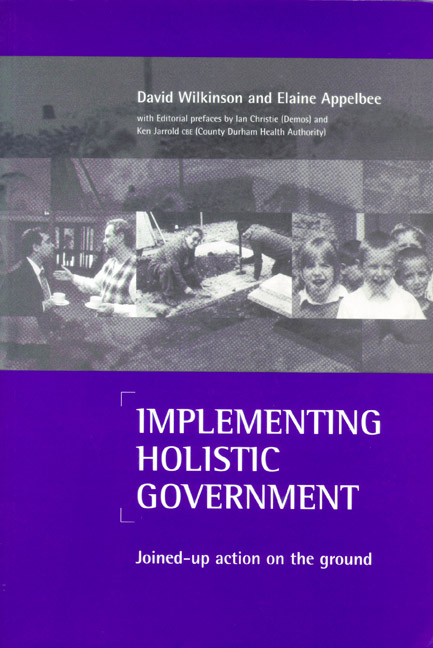Book contents
- Frontmatter
- Contents
- Editorial preface
- Editorial preface
- Acknowledgements
- Summary
- 1 Setting the context
- 2 The functional inheritance and its consequences
- 3 The public service, community interface
- 4 Change that works – sustaining community and quality of life improvement
- 5 Change that works – sustaining organisational and whole system change
- 6 Developing the middle ground: where bottom-up meets top-down (a third way for local governance?)
- 7 Improving sustainable quality of life: the benchmark for Best Value
- 8 Joined-up action on the ground: six key issues that have to be addressed
- 9 Working in the middle ground: recommendations to promote joined-up action on the ground
- References
8 - Joined-up action on the ground: six key issues that have to be addressed
Published online by Cambridge University Press: 05 July 2022
- Frontmatter
- Contents
- Editorial preface
- Editorial preface
- Acknowledgements
- Summary
- 1 Setting the context
- 2 The functional inheritance and its consequences
- 3 The public service, community interface
- 4 Change that works – sustaining community and quality of life improvement
- 5 Change that works – sustaining organisational and whole system change
- 6 Developing the middle ground: where bottom-up meets top-down (a third way for local governance?)
- 7 Improving sustainable quality of life: the benchmark for Best Value
- 8 Joined-up action on the ground: six key issues that have to be addressed
- 9 Working in the middle ground: recommendations to promote joined-up action on the ground
- References
Summary
“The people who are in power have just sat back and watched it get like it; the people who live there have sat back expecting the people who run the borough to do something about it.” (Walsall resident quoted in Neighbourhood Governance in the Borough of Walsall)
“I fear the professional cultures of people working in housing and social services will militate against the government's proposals. Working as a housing officer in a deprived area, I witness every day the appalling ‘top-down’ managerial approach. Any money that comes our way has been ‘spent’, regardless of local opinion. This is coupled with backbiting between different departments. Mr Blair needs to change the cultures of those who work in the target estates, not just those who live in them.” (Name and address supplied, letter to The Guardian on 18 September 1998 in response to the Prime Minister's launch of the Social Exclusion Unit's report, Bringing Britain together)
The unfolding public service agenda provides superb opportunities for creating purposeful change that can substantially improve the quality of life for many – especially for those in more disadvantaged communities. In addition, many in the public services are beginning to recognise these exciting new possibilities. We are clearly on the threshold of developing for the future radically new approaches of dealing with the key public service outcomes that concern the population.
However, the historical legacy must also be recognised and dealt with, if this promise is to materialise. There are six key issues that have to be addressed if the goal of joined-up action is not to be subverted into so much joined-up rhetoric. These are of equal significance to both policy formulation, and to implementors and practitioners. They are drawn from the preceding chapters and highlighted because of their potential significance (because they draw upon this material, this chapter has not been referenced).
Developing evidence-based approaches to change: using the research
Perhaps the saddest and most frustrating aspect of so much change effort is the widespread ignorance of what works – this is all the more poignant where social and economic regeneration initiatives are concerned. In part, this may be because much of the evidence, not surprisingly, points to multi-pronged, multi-agency interventions into complex systems of causation.
- Type
- Chapter
- Information
- Implementing Holistic GovernmentJoined-Up Action on the Ground, pp. 137 - 150Publisher: Bristol University PressPrint publication year: 1999



